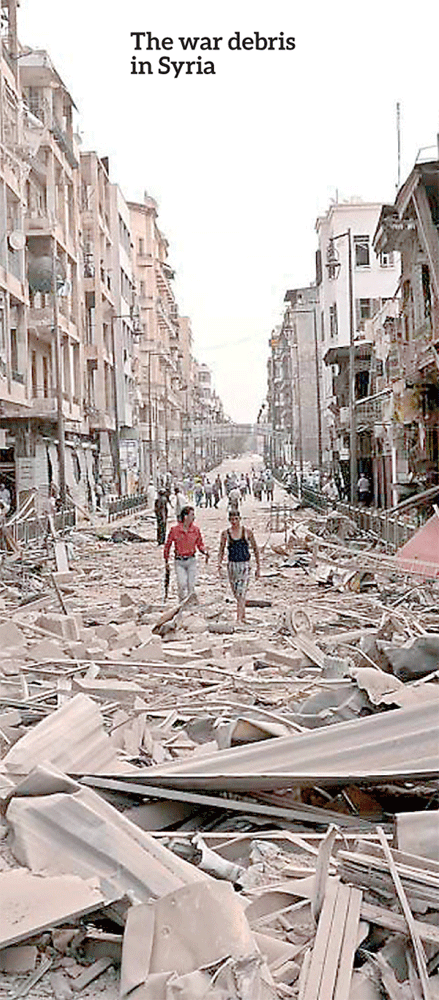Reply To:
Name - Reply Comment
Adam Barborich studied in the Pennsylvania State University, USA. His interests lie on various disciplines including mining engineering, business administration, political studies and Buddhist Philosophy. He travels extensively and has an undying interest in elephants and their behaviour. He can speak five languages and they are English, French, Spanish, Italian and Finnish.
 s we follow the events in Iraq and Syria, it is difficult not to be troubled by the brutal violence of ISIL.
s we follow the events in Iraq and Syria, it is difficult not to be troubled by the brutal violence of ISIL.
The most troubling aspect of this violenc e is that it often manifests itself with cold rationality. The massacre of non-combatants and prisoners in a manner reminiscent of Genghis Khan acts as a force multiplier in a military sense, sending a warning to unconquered places that resistance is futile. Photographs and videos of beheadings and other atrocities are cunningly used for recruitment and to achieve aims in accordance with its broader strategy.
e is that it often manifests itself with cold rationality. The massacre of non-combatants and prisoners in a manner reminiscent of Genghis Khan acts as a force multiplier in a military sense, sending a warning to unconquered places that resistance is futile. Photographs and videos of beheadings and other atrocities are cunningly used for recruitment and to achieve aims in accordance with its broader strategy.
It is this broader strategy that is truly disturbing. Terrorism is said to be a form of theatre, and ISIL plays the part of an Islamist revolutionary force engaged in revolutionary violence to the outside world, but in reality the ISIL “revolution” is nothing more than an orgy of nihilist destruction. ISIL is not made up of the oppressed lashing out at the oppressors with a disproportionate and irrational spasm of violence motivated by revenge. ISIL leadership is well-educated and executing a coldly rational military strategy.
ISIL is many things, but it is not delusional. It understands that it cannot hope to carve out a lasting state in the current political climate. Unlike established Islamic regimes, ISIL does not even attempt to bring forward any novel concepts in Islamic revolutionary governance, preferring to loosely govern occupied territory through terror and sectarian violence. ISIL welcomes the foreign intervention that will eventually destroy itself as an organisation. Like the Nihilist Movement of the late 19th - early 20th century in Tsarist Russia, ISIL aims at destabilisation of society via propaganda of the deed. If there is any revolutionary hope beyond that, it is at best a vague idea that chaos will allow a stronger Islamist movement or movements to take power through revolution.
 It is this fundamental nihilism at the heart of ISIL that causes the hysteria and panic we see surrounding the organisation. For many years there has been an assumption in liberal thought that all conflict is ultimately rooted in classism, economic disparities, ethnicities, materialism, racism or religious differences. If we operate from that assumption, it follows that we can end any conflict by rationally diagnosing its causes and finding rational solutions to the underlying problems. It is a comforting idea and creates in our minds an idealistic world controlled by reason and sensibility. It is also false.
It is this fundamental nihilism at the heart of ISIL that causes the hysteria and panic we see surrounding the organisation. For many years there has been an assumption in liberal thought that all conflict is ultimately rooted in classism, economic disparities, ethnicities, materialism, racism or religious differences. If we operate from that assumption, it follows that we can end any conflict by rationally diagnosing its causes and finding rational solutions to the underlying problems. It is a comforting idea and creates in our minds an idealistic world controlled by reason and sensibility. It is also false.
The real world is unpredictable, irrational and constantly on the edge of chaos. Yet many commentators still attempt to force irrationally motivated and nihilistic organisations like ISIL into paradigms that equate them with rational liberation movements. This is willfully burying one’s head in the sand.
Instead, the ISIL phenomenon must be addressed honestly and realistically. ISIL is not representative of the traditional religion of Islam and it is important that this distinction is made. However, ISIL does tie itself to the philosophical movement of political Islamism at the extremist end of the spectrum. Therefore, to effectively combat ISIL it is necessary to examine the appeal of the broader Islamist movement.
Human beings are religious creatures. Even when we try to leave the traditional religions of our past behind, we simply end up creating new religions. We deify ourselves and call it “humanism”. We elevate “market forces” or Adam Smith’s “invisible hand” and depend on its workings to solve all of mankind’s problems and call it “neo-liberalism”. We place our faith in “dialectical materialism” and find ourselves at the mercy of god-like Hegelian forces of history and dependent on a quasi-religious faith in the inevitability of “progress”. Man’s nature is that if he does not find meaning in traditional religion, he will simply create new religions. This is most often manifested in what are known as “political religions”.
At its most basic level, Islamism is a “political religion” that borrows the language of Islam. As Marxism, Neo-liberalism and Social Democracy struggle to maintain their vitality as the dominant political religions of our day, Islamism is attempting to place itself as the best alternative to what it perceives as antiquated and failed political religions. As people perceive decadence in modernism and in our dominant political religions, many will seek out different principles that counter the perceived weaknesses of our society and offer to improve their individual lives. Many will return to the religious practices of their youth, some will experiment with new religious beliefs, others will seek out a more fundamentalist version of traditional religion and some will become zealots in whatever political religion they believe can cure society’s ills.
To address the larger Islamist movement, and by extension violent radical elements like ISIL at the fringes of that movement, it is necessary to see the legitimate faults they point out in our societies.
We all see corrupt governments around the world using “democracy” to provide political legitimacy for the robbery of their nations’ coffers. We see people labouring in the most inhuman conditions to eke out the most basic existence.
We see a decline in manners and social values justified as “individual freedom”. We see usury and wage slavery passed off as “sound economic policy”. We see the international financial system enslaving the developing world. Many of us are disillusioned with these things, and so are the Islamists. Rightly or wrongly, Islamism has gained traction as an alternative to the status quo.ISIL takes these developments one step further and seeks the total abrogation and annihilation of the status quo. It indulges its passion for destruction with a great and exalted hatred. It’s no coincidence that so many foreign fighters join with ISIL. The primal scenes of violence and destruction for destruction’s sake appeal not to traditional religious Muslims or the struggling proletariat, but to disillusioned bourgeoisie youth who’ve been brought up in a culture of nihilist materialism and consumerism. Our own societies and our own failures have become the tool that ISIL turns against us. ISIL senses the underlying nihilism in our westernized consumer cultures and offers an outlet for the destructive impulses our societies cultivate in the form of primal violence and warfare. The most brutal violence is justified as someday leading to a meaningful and moral world, a world that is the opposite of the world as it is perceived now. Paradoxically, we have nihilists fighting on the ramparts of morality.
This is why ISIL is so feared, not because of their military or political prowess, but because they point at something deeper that must be addressed. ISIL will be crushed militarily in short order by the international community, but the nihilism that fuels it is yet to be addressed. We continue to run our governments and societies within the materialist paradigm. We still attach value to basic necessities of life in monetary terms. We continue to see our social ethic decay under the influence of moral relativism. We treasure freedom, but find we are only free to be another cog in a consumerist machine. We develop the technology to put men on mars while we let our fellow man starve here on Earth. We create doctrines like human rights not to give human beings legal rights, but so cynical governments can use it as cudgel against weaker nations.
We can’t defeat nihilists like ISIL on the field of battle, we can only defeat them by reasserting our values and ensuring that our values offer a better alternative than the status quo. We must start at the bottom and move up. We must decide the kind of family, the kind of village, the kind of city, nation and world we want to build and inhabit. The battle against ISIL must be a battle for humanity. It cannot be fought with weapons. It can only be fought with ideas.